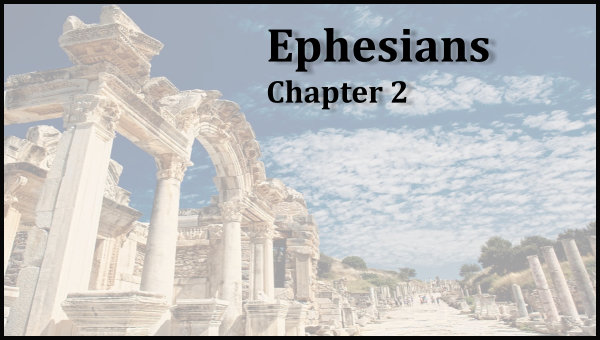By Tyson Thorne

Let’s start this chapter with a reminder that this chapter dicvision is absolutely meaningless in the context of the original language. As we’ve learned, chapter one is actually one long sentence. Chapter two does not continue in that run-on manner, but does connect the same ideas. In fact, the first word of the second chapter is kai, the Greek word for “and”. Paul is continuing his thought process from the first chapter, so ignore the titles, the chapter and the verse divisions in your Bible and see this as part of the same context.
In Greek, chapter two’s first three verses are one incomplete sentence best ended with an elipses in English. While this may not be proper grammar in English Paul uses this device to build tension. He is stating the problem of man and causing the reader to become anxious for the solution.
“You were dead in your transgressions and sins in which you used to walk along this world’s path, the same path that the ruler of the air and the ruler who energizes the son’s of disobedience tread, and we did so in the cravings of our flesh, indulging its desires and the desires of the mind, and were under the same guilty verdictas they making us children of wrath…”
In short, we lived in sin among sinful people and sinful spiritual beings; all our lives were under the devil’s thumb and all our fates were one of doom. This is the life of all unregenerate people, and it is an alarming state with a terrible fate. As horific as such a state is, that state is no longer true of us. Why? Because of God, our hero.
Verse four, the second sentence of the chapter, begins with God. In mercy and love, despite our spiritually dead and sinful condition, chose to raise us to spiritual life even as He rose Jesus to physical life. Also, just like he did with Jesus, God has seated us in his kingdom for the aeons to come. Paul makes it very clear that we have done nothing to deserve this grace -- indeed a dead man cannot do good deeds – and that our salvation is purely a gift from the Father. But there is something buried in these verses that is not very apparent in the English text.
In English there are three tenses: past, present and future. Greek has another tense, present action that continues into the future. This tense is used in regard to the word “salvation” in both verse 5 and 8 and is used to indicate the once-for-all salvation from God’s wrath and the ongoing sanctification of the believer that results from this state of grace. The idea of the phrase in verse five then, is: by grace you have been saved and are continually being saved until the completion of of your salvation. This should provide further evidence to the careful student of the Bible for eternal security. God has saved us and is continually saving us into the future. At no point is our salvation based on any work of ours, therefore it cannot be lost by any work of ours. Our salvation is guaranteed by God himself!
What we’ve learned so far: God’s plan from the beginning has been to make Jesus the authority over all things, a plan that has come to fruition. The completion of that plan came about when God provided his greatest display of power –the raising of Jesus from the grave! Today the body of Christ is the power of God continually exercised around the world. We have become Jesus’s body on earth through the salvation that he has freely given us and continues to provide for us until the day of completion. This salvation was provided due to no merit or action of our own, but benefits us as we are no longer objects of wrath but fellow citizens of God’s kingsom for the ages to come.
|
|
